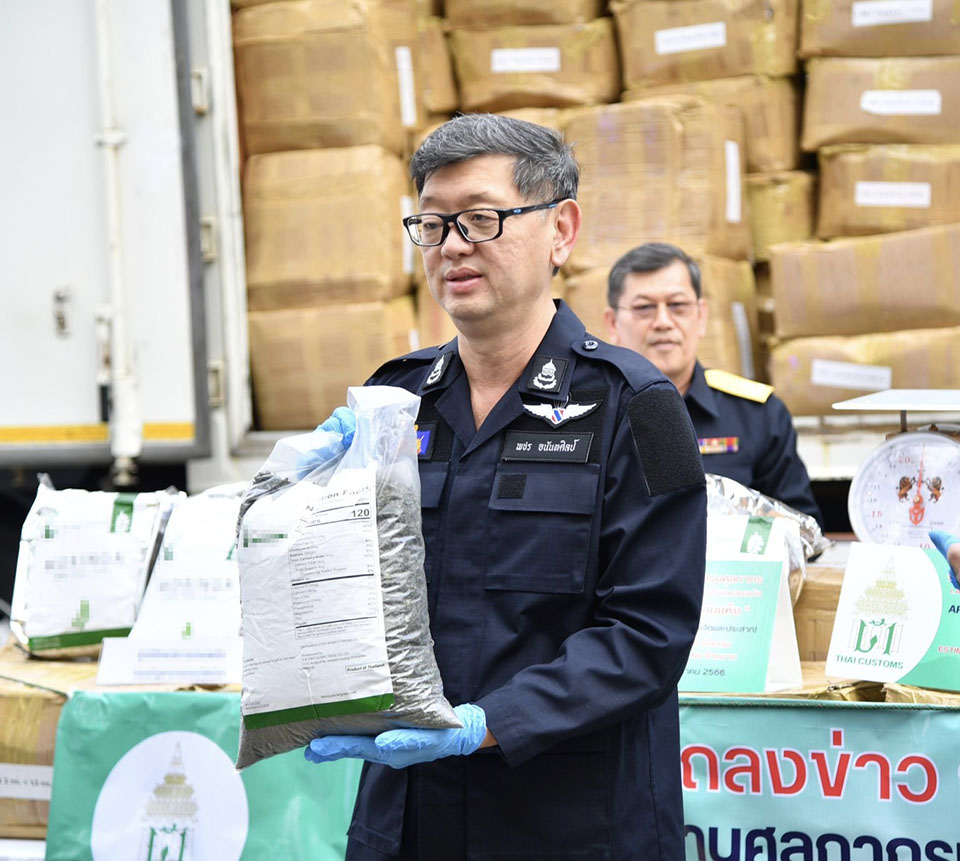
Mr. Patchara Anuntasilpa as Director General of Thai Customs Department, Mr. Pongthep Buasap acting as Principal Advisor on Customs Control Development, Mrs. Nantita Sirikup as Deputy Director General of Thai Customs Department, Mr. Tawal Rodjit as Director of Enforcement Division, Mr. Suradej Trongsirivibool as Director of Laemchabang Port Customs Office, Mr. Varis Visantanon as Expert on Cargo Inspection Techniques, Mr. Prasit Deejongcharoen as Director of Customs Control Section, Mr. Thitiphong khumphuy as Director of Customs Service Section 1 and Mr. Setthawut Chantrawattana as Director of X-Ray and Technology Center, together with officers of Office of the Narcotics Control Board (ONCB) from Ministry of Justice, and the Narcotics Suppression Bureau from the Royal Thai Police conducted a press conference to announce the seizure of Psychoactive plant or dried Khat leaves weighing 5,600 kilograms with an estimated value of 60 million Thai Baht.
According to Mr. Pachara Anantasin, Director General of the Customs Department, the PCU Project: Anti-Narcotics War was started on December 21, 2022, by the Laem Chabang Port Customs Office with the intention of searching packages and vehicles in the vicinity of Laem Chabang Port in order to prevent and suppress drug smuggling networks. The PCU Project’s Anti-Narcotics War EP.1: It Call “Khat” operation was started by the Customs Office of Laem Chabang Port officers who scrutinizing suspicious shipments. As a result, today the officers seized and notified the relevant agencies to jointly inspect such goods at the Customs Control Section of the Laem Chabang Port Customs Office.

The inspection of the imported container revealed that the import declaration listed “moringa leaves powder” with a weight of 5,670 kilograms and “Kenya” as the place of origin. The product’s physical characteristic was dried plant leaves packaged separately in silver and transparent plastic bags. These bags were stuffed into brown paper crates weighing a total of 5,600 kilos. The package misleadingly said, “Products of Thailand,” implying that the product was manufactured in Thailand. The officers studied the Phytosanitary Certificate and discovered that the importer presented “CATHA EDULIS” as the botanical name of the plant they were importing; hence, they took samples of the products and sent to verify type of goods at Narcotics Analysis and Technical Services Institute. The examination report of the Office of Narcotics Control Board (ONCB) determined that the product was “Khat leaves” containing Cathinone and Catenin chemical, which were designated as controlled psychotropic substances, category 1 and category 2 under the Narcotics Act B.E. 2564.
This seizure of dried khat leaves weighing 5,600 kg and valued at 60 million Thai Baht was the largest in the past five years. Khat leaves and Qat leaves are indigenous to Africa and the Arabian Peninsula. The World Health Organization categorizes it as a narcotic plant having mild to moderate psychoactive properties. The consumption of khat leaves can be addictive or cause immediate health problems, such as acute coronary heart disease, or even death.

Therefore, the officers seized the exhibit for further investigation and filed an accusation that such conduct constitutes an offense for attempting to import psychotropic substances in violation of Section 149 (1) (2) of the Narcotics Act B.E. 2564 , the Notification of the Ministry of Public Health Re : specifying the names of controlled psychotropic substances in category 1 B.E. 2564 and the Notification of the Ministry of Public Health Re : specifying the names of controlled psychotropic substances in category 2 B.E. 2564. Including the instance of introducing handicrafts with false origins into the Kingdom of Thailand, which is a violation of Section 5 and Section 6 of the Prohibition to Import Goods with False Marking of Origin Act B.E.2481. Sections 202 and 244 comply with Sections 252, 166, and 167 of the Customs Act, B.E.2560, in case of importation of prohibited goods into the kingdom of Thailand. (NNT)

 |
 |
 |




